- Home
- Piers Anthony
Chaining the Lady Page 5
Chaining the Lady Read online
Page 5
"Agreed," Melody said.
"I'll say!" Yael exclaimed. "Can't test the spies without making it worse."
"So we have initiated a quasi-legal program of hostage identification and research. This is not under the direction of our governing Ministers, because we know that at least one of them is himself a hostage. But our program is essential to the welfare of our segment and our galaxy. If the Andromedans infiltrate and conquer us, our entire galaxy may perish—literally. For they mean to draw away the binding energy of our atomic structure to facilitate the power required for their advancing civilization, and our very substance will disappear in the course of a few thousand years."
Melody understood. She believed the Polarian, and knew now that it was no idle reason that chained her to this host. The survival of her galaxy was at stake. She would have to do what was required, however inconvenient it might be to her personal life.
"We operate through the Society of Hosts," the Polarian went on, "because they alone possess the aural expertise to assure the absence of hostages in their own ranks. This is why it is necessary for all our operatives to join the Society. Aural verification is an unquestioned requirement for entry. No suspicion attaches. The Society has undertaken research into hostaging, but has been unable to duplicate the Andromedan technology. Perhaps if a living hostage could be studied—but we dare not touch any that we know of on this planet, because that would give away our knowledge to the Andromedans and precipitate an immediate crisis that could cost us the war."
The Colonel smiled approvingly. "Not only are you sounding like a Solarian, now—you're talking like a military man."
"At times thrust has its applications," the Polarian agreed, glowing with distaste. "But circularity will be required for the resolution."
"Agreed," the Colonel said. "Sorry I butted in."
"It is the nature of your kind," Fltosm said generously. Then, to Melody: "Society calculations indicate that a hostage can be reclaimed through our existent technology, provided the hostage is rendered unconscious and laid under siege by a completely superior aura of the same family. Perhaps a different aural family would succeed also; that is less certain. You understand how auras exist in related types, apart from intensity, some being compatible and others so diverse as to be incompatible?"
"Yes," Melody said. "This accounts for what was historically known as 'instinctive' attraction or repulsion between given entities. A parallel could be made to your Solarian or Polarian blood types."
"Yes. But even with a reasonably close match, the margin of superiority would have to be at least four to one over the besieged aura. The technology of Andromeda has evidently abated this necessity, but we of the Milky Way must resort to comparatively crude force. Therefore—"
"I believe I understand you at last," Melody said. "You have located a hostage whose controlling aura is of my own aural type, too high for any other entity to overwhelm."
"Precisely. It is a female hostage governed by an aura of fifty-two times normal intensity."
"So you need an aura of two hundred and eight," Melody finished. "Not many exist."
"This is true. The highest available in Segment Etamin is one hundred fifty-nine, female—and she is of the wrong type. In fact, there are no female auras above one hundred and eighty in the galaxy—except for yours. You are thus indispensable. By the time the hostage's aura fades to under forty, enabling another agent to make the attempt (ignoring for the moment the complication of typing, which may after all be irrelevant), one hundred and twenty days will have passed—and we shall have lost a crucial advantage, perhaps even the war itself. The potential information this hostage possesses is incalculable, and the element of surprise is also vital. Because she happens to be in a situation in which the Andromedans are unlikely to suspect any attempt at counterhostaging, we may be able to conquer her without their knowledge."
"So you will retransfer me into that body, whereupon I will be able to tap the secrets of Andromeda," Melody said. "This is the mission for which you originally summoned me, isn't it?"
"True."
"But you cannot require any more of me than this one service. Within one day I'll be home—and Imperial Outworld won't bother me again, though the galaxy perish."
"True. The welfare of the individual preempts that of society in our Sphere, and the terms of the debt exchange must be honored."
"Fair deal. Show me your hostage."
"It is a Solarian officer aboard a Sphere Sol ship in space—the flagship of the Segment Etamin fleet. It will be necessary to mattermit you to a shuttlecraft, that is now completing its voyage to that fleet. After the mission, we will transfer you directly back to your Mintakan body."
"Very pretty," Melody remarked. "Were I in a Polarian host, I could think of another manner to abate debt."
Fltosm glowed. She had paid the Polarian the courtly compliment of suggesting it was a suitable partner for mating. Polarians, like Mintakans and in contrast to Solarians, arranged for mating on intellectual grounds. It was a system that made sense to the mature mind.
"I am jealous," the Colonel said, smiling. And this was a lesser compliment, for he had seen up her host-legs and was reacting in the Solarian manner. But it reminded her: In this host, sex was not merely a mode of reproduction, but a tool of social influence. She must keep that in mind, in case she had need of it.
4
King of Aura
*you missed a council meeting, :: *
:: necessary omission swallowed a hard rock progress? ::
*located focus of resistance in segment etamin it is the society of hosts*
:: that will require a special effort ::
*I am sure dash will make it*
:: with what result remains to be noted ::
The fleet was impressive. It was rather like a great city in deep space, or a miniature galaxy. A concentration of planetoids, a diffuse globe—no, a cluster, she decided, with the concentration in the center and thinning bands extending out. Beautiful.
It was of course an anachronism, since such ships were limited to sublight speeds, so could not even traverse a single sphere, let alone a segment, in a normal sapient lifetime. But the rationale was that it might one day be possible to transfer spaceships. At such time as that particular technological breakthrough occurred, the military reasoning went, the Age of Empire would come. So these ships were built and maintained and operated at phenomenal expense—in a parking orbit around Star Etamin. The other segments all had similar fleets. Similar follies, Melody thought. But the fleet was spectacular, at least in the shuttle's viewscreen.
The shuttle shot toward the center, decelerating with a vigor that caused respiratory discomfort to the host-body. Melody had been phased in to the travel-velocity of the shuttle, which itself was phasing in to the orbital velocity of the fleet; now there was a lot of inertia to counter. But Melody insisted on sitting up so that she could watch the screen. There was also a port, but it was useless; the ships were not visible to her untrained naked eye. So she braced the sagging mammaries with one forearm, clenched her jaw to keep it from drawing down painfully, and stayed with the screen. She had never seen a space fleet before, and never expected to see another; this was interesting.
Beside her, a novice Solarian crew-member also watched. His head-hair was of reddish hue, and at the moment so were his eyes. Melody knew this was from the temporary stress of deceleration on the surface veins of the eyeballs; the normal color of the main part of the ball was white, even on brown or black-surfaced entities. But the contrast of red eyes and blue skin was momentarily striking. Though she probably looked much the same. Her host's skin, now that she thought about it, was a delicate blue. That was the native color of Outworld. Green, rather; Melody was not yet precise about color vision. It occurred to her, however, that this could be a handy coding system for species with a lot of skin surface, like the Solarians: a different color for each star.
"Isn't that—something!" the man gasped. Althoug
h he had been aboard the shuttle when she mattermitted on, he had not seen the fleet before.
"New to you, too?" Melody asked. This formal query when the answer was either known or irrelevant was one of the little Solarian niceties of interaction.
"Yes. I've never been to space before." Like her, he spoke through clenched teeth, though his jawline still sagged somewhat.
"Neither have I." Now they had a common framework and she was surprised to discover that it did make her feel more at ease. She paused for several shallow but difficult breaths, aware that his eyes were following the labored movements of her chest. This sidewise torque did his eyeballs no good; he should have clamped down his eyelids for added support. But it seemed the male liked to see even the suggestion of female points of distinction, despite the concealment of cloth and discomfort of gravity. "Who are you?"
He hesitated. "Call me March," he said at last. There was a suppressed stress on it that did not seem to be entirely due to the deceleration. Was that his real name? But he could not be another transfer agent; his aura was merely galactic norm. Normals could not detect the feel of neighboring auras, but high-Kirlians could. Maybe he had been drafted, and did not like being reminded of his happy past. Possibly he had been assigned to watch her, in case her own inexperience led to complications. Yet he had started the shuttle trip well before she had been summoned to Imperial Outworld. Could he have been a convict, released from the prison-colony planet of this system, now shunted to space service? No; he seemed too young, too innocent. She was inclined to trust him. To a reasonable extent. "Yael," she said.
"They messaged me... you were coming," he said. His power of speech was fading; this deceleration was an awful strain. "But they did not tell me"—a pause to catch up on breathing—"how pretty you would be."
"Hey, I like him!" Yael said.
"Then you answer him," Melody replied to her. "It's your body he admires. Mine would sicken him." And she turned over control of the vocal apparatus.
"Thank you," Yael said aloud. "You're not bad yourself. Are you from Outworld?" As though a green man could be from anywhere else.
"The deepest backvines," March admitted.
"Me too." They exchanged smiles. Then the stiffening deceleration forced them both to be silent.
Melody faded in and out, and time became expanded or condensed—she was not quite sure which. The view-screen showed them passing the layers of the cluster fleet like a comet swinging in to its star. First there were the small scouts, needleshaped because that made them harder to spot and hit as they moved about. It had nothing to do with atmospherics; they flew sidewise as readily as forward, orienting to keep their smallest cross section facing the enemy. They quested far beyond the main mass of the fleet, poking into whatever crannies of space they spied, like curious insects, maneuvering unpredictably. How convenient the human-host imagery became; there were no insects on Melody's home planet.
Melody found her human tongue twitching around in her mouth, and her nostrils narrowing. She stopped it; she could not afford such reactions. The specialists of Imperial Outworld had insisted on providing her with a weapon of self-defense despite her protests. Now it was in her nose: two electrically neutral tubelike units whose mechanism could be invoked by the proper combination of air and pressure. She did not dare try to remove the units; they were of the self-destruct variety—or so the Colonel had assured her. But she had no intention of using them. So she quelled her reactions and returned her attention to the fleet.
The next layer consisted of the more disciplined system of attack craft—small, expendable ships which could move out fast and deliver a wallop. Like poisonous reptiles—another analogy lifted from the convenient mind of her host, who seemed to have a ready imagination for such things—they were brightly colored. Perhaps, however, that was merely enhancement by the screen, color-coding them to match the Spheres with which they were associated: Sol, Polaris, Canopus, Spica, Nath... and even her own Mintaka? How beautiful it must look—if she could only be sure which one it was.
Of course many of these ships had not been constructed within the Spheres with which they were associated. It would have taken the Mintakan craft three thousand years to travel at half-light speed from Mintaka to Etamin— and that was longer than the segment had existed. Mattermission would have done it instantly, but was prohibitively expensive for an entire space ship. Transfer was instant and cheap, but of course it was not possible with inanimate objects. It was strictly an energy phenomenon: living energy in the form of Kirlian auras, dead energy in the form of magnetic power or "strong" atomic force. Some theorists thought that the Ancients had been able to imbue physical objects with auras so they could transfer them cheaply to far parts, but few really believed that. Except, perhaps, the military entities who had conceived of these segment fleets all over the galaxy. Regardless, that technology did not exist today. So the ships had to be constructed right here in System Etamin, by transferred entities from other Spheres. Mind, not geography, was the guiding factor: a Mintakan ship was made by genuine Mintakans, though they used human or Polarian bodies. Any Mintakan spacefarer would be at home aboard it. Except someone planetbound like Melody, who had never even seen a Mintakan spaceship before.
Then she did a double take, surprising herself again by this human mannerism. It was a kind of backing up and second inspection with a sensation of mild amazement. "That's Tarot!" she exclaimed.
"That's what?" Yael inquired, and March's head turned slightly. Each thought the remark had been directed at her/him, since Melody had spoken out loud.
"The Mintakan ship; it's shaped like the Broken Atom of the Tarot Suit of Aura. At least it looks that way on the screen."
"It's to provide spin while gathering light-energy," March explained. "I was briefed about the fleet before I was exiled. The ships from Segment Knyfh are similar. An outer shell to collect the light, and an inner nucleus for the crew. The whole thing rotates just fast enough to provide proper gravity."
"How ingenious!" Melody said. Then they both paused for breath again, and she wondered: What was this about his being exiled? But she was sure it would be inappropriate to inquire, and at the moment she was more intrigued by the shapes of the ships, now so clear in the screen.
Some were like great wide-bladed swords, others like monstrous coins, still others like wands or cups. "To think it's been right there under my strings—I mean nose —all this time, all my life, and I never thought to look!" Melody exclaimed to Yael. "All these ships of space— we are a Tarot-symbol segment!"
Yael was diplomatically silent. She knew little of Tarot, and less of symbolism, and hardly saw either the relevance or significance of such a connection. So what if a sword was used as the shape of a ship and the symbol on a card? What was wrong with that? So long as each design could collect the light, as March had explained, and spin up enough gravity....
And this in turn gave Melody further pause for thought. There was not only a substantial aura differential between them; there was an intellectual gulf. Yael was just below the human norm in intelligence, moderately below in education, and well below in intellectual experience. Melody was between 1.5 and 1.7 on the Mintakan intelligence scale, roughly analogous to the human scale, and possessed a Segment Doctorate in General Learning. And she had a full lifetime behind her. Yet she realized now that there were fundamental equivalencies between her mind and that of her innocent host. They were both female, despite the technical asexuality of Mintakans, and both were novices in this particular situation. Given that basic set of similarities, Melody was able to appreciate the human girl's view—and to grasp for the first time in her life what it meant to be intellectually handicapped. Yael genuinely could not appreciate the insights to be obtained from the observation of the parallelism of designs. But she didn't feel stultified, did not suffer directly; she was literally too stupid to know what she was missing. Yet she was in every sense a person, a conscious, feeling entity.
It was a lesson in
perspective that Melody hoped never to forget in the few years remaining to her. For she knew most of the sapients in the galaxy were more like Yael than like Melody. Melody had existed in an ivory tower, and it was now being blasted apart by new experience, exactly as the applicable Trump of the Tarot suggested. She had never realized how specifically it could pertain to her—which was part of this very experience. The strike of the lightning bolt enabled her to understand the nature of that lightning bolt.
Now the shuttle's deceleration had eased off, and it was orienting on the hull of the mighty flagship, the Ace of Swords. The handle of the sword had seemed small from a distance, but it was a Solarian mile in diameter. This huge rotating mass resembled a veritable planetoid! The ship's magnetic tractor field took hold of the shuttle and guided it into the end of the handle, where there was no gravity right at the axis of rotation. In virtual free-fall the little craft settled into a huge airlock, and a metal covering slid over it. They had docked.
Gas flooded the compartment, and Melody was reminded of her Tarot yet again: Naturally there was gas, since war and all things military were associated with the Suit of Gas whose symbol was the Sword. Solarians as a species were identified with the same suit. Not for nothing was it said throughout the segment: "Trouble, thy name is Sol."
Pressure equalized. Melody unstrapped herself, discovering that she could stand, though gravity was minimal here. The port opened and she stepped carefully out, as March deferred to her in a reflex of Solarian etiquette that thrilled Yael. Half floating, Melody came to rest on the deck of the big ship. She found herself in a roughly hemispherical chamber formed by the inner curve of the hull and the dimly illuminated airlock panel above. "So this is the Ace of Swords," she murmured.
In a moment a door phased open and a space officer strode in. He was a handsome Solarian of middle age, the blazon of Imperial Outworld on his chest: a neat superimposition of the ancient letter symbols O and W, the straight lines of the latter segmenting the former into five subsections:

 Serial
Serial Question Quest
Question Quest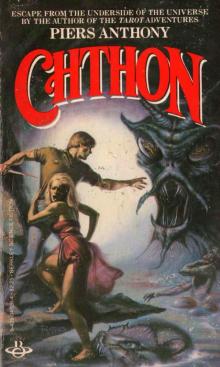 Chthon
Chthon Dragon on a Pedestal
Dragon on a Pedestal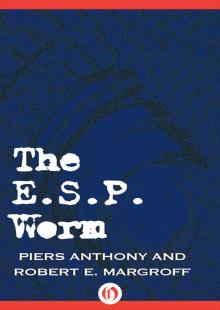 E. S. P. Worm
E. S. P. Worm Hope of Earth
Hope of Earth The Series Boxed Set
The Series Boxed Set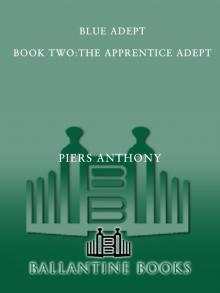 Blue Adept
Blue Adept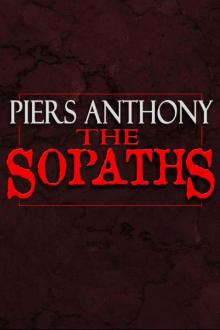 The Sopaths
The Sopaths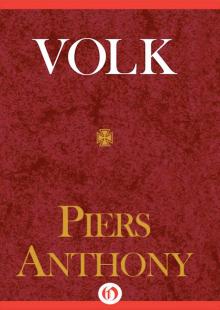 Beetle Juice
Beetle Juice Awares
Awares Golem in the Gears
Golem in the Gears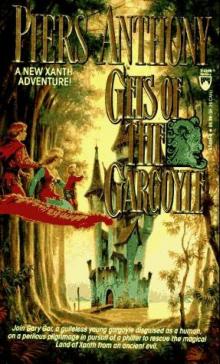 Geis of the Gargoyle
Geis of the Gargoyle Bamboo Bloodbath and Ninja's Revenge
Bamboo Bloodbath and Ninja's Revenge Heaven Cent
Heaven Cent Neq the Sword
Neq the Sword Pandora Park
Pandora Park Juxtaposition
Juxtaposition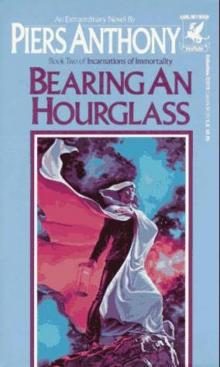 Bearing an Hourglass
Bearing an Hourglass Dragon Assassin
Dragon Assassin Board Stiff
Board Stiff Virtual Mode
Virtual Mode Castle Roogna
Castle Roogna Aliena Too
Aliena Too Pet Peeve
Pet Peeve The Metal Maiden Collection
The Metal Maiden Collection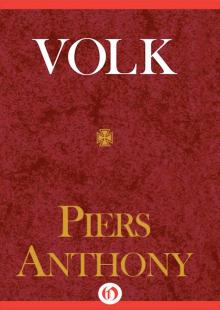 Volk
Volk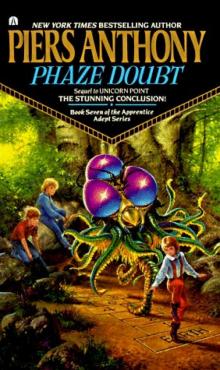 Phaze Doubt
Phaze Doubt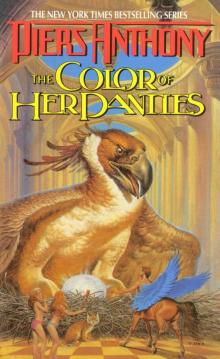 The Color of Her Panties
The Color of Her Panties Amazon Slaughter and Curse of the Ninja Piers Anthony
Amazon Slaughter and Curse of the Ninja Piers Anthony The Worm Returns
The Worm Returns Zombie Lover
Zombie Lover Xone of Contention
Xone of Contention The Gutbucket Quest
The Gutbucket Quest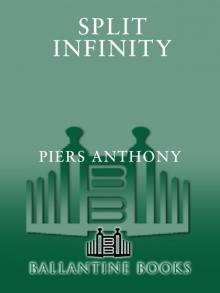 Split Infinity
Split Infinity Dream a Little Dream: A Tale of Myth and Moonshine
Dream a Little Dream: A Tale of Myth and Moonshine Balook
Balook Out of Phaze
Out of Phaze The Secret of Spring
The Secret of Spring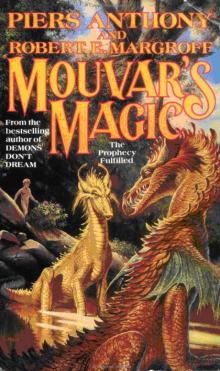 Mouvar's Magic
Mouvar's Magic Cube Route
Cube Route Mercenary
Mercenary Total Recall
Total Recall Man From Mundania
Man From Mundania The Magic Fart
The Magic Fart Letters to Jenny
Letters to Jenny Jack and the Giants
Jack and the Giants Executive
Executive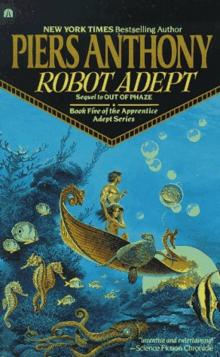 Robot Adept
Robot Adept On A Pale Horse
On A Pale Horse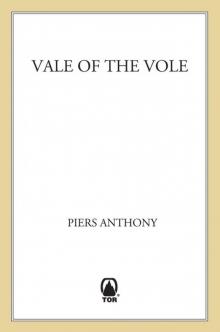 Vale of the Vole
Vale of the Vole Crewel Lye
Crewel Lye For Love of Evil
For Love of Evil Spider Legs
Spider Legs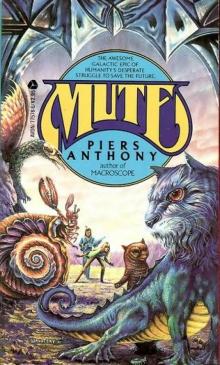 Mute
Mute Being a Green Mother
Being a Green Mother Hair Suite
Hair Suite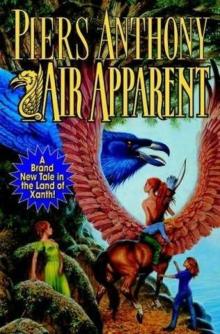 Air Apparent
Air Apparent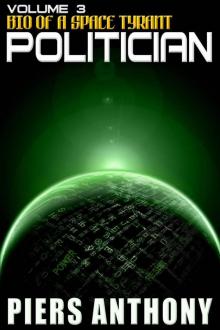 Politician
Politician Aliena
Aliena Phthor
Phthor Ghost Writer in the Sky
Ghost Writer in the Sky Pornucopia
Pornucopia Eroma
Eroma Shepherd
Shepherd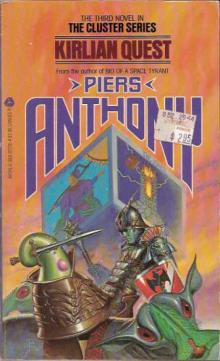 Kirlian Quest
Kirlian Quest Swell Foop
Swell Foop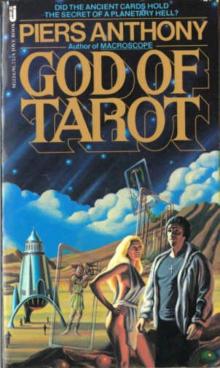 God of Tarot
God of Tarot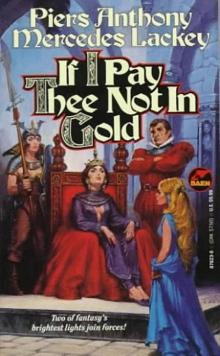 If I Pay Thee Not in Gold
If I Pay Thee Not in Gold Amazon Expedient
Amazon Expedient Faun & Games
Faun & Games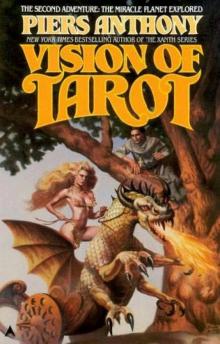 Vision of Tarot
Vision of Tarot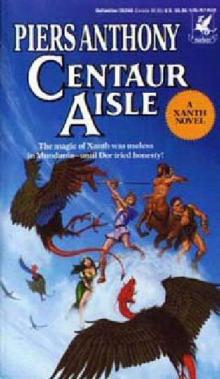 Centaur Aisle
Centaur Aisle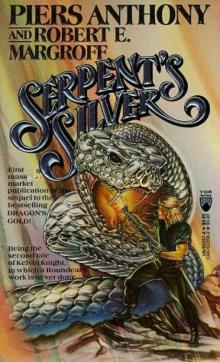 Serpent's Silver
Serpent's Silver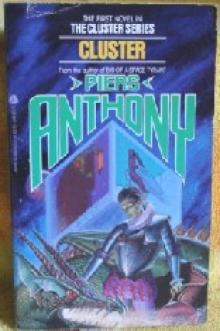 Cluster
Cluster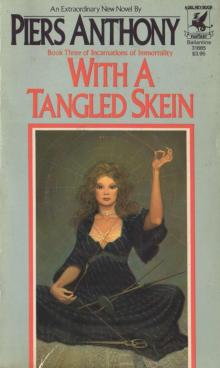 With a Tangled Skein
With a Tangled Skein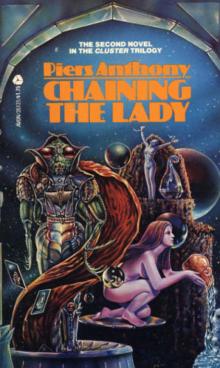 Chaining the Lady
Chaining the Lady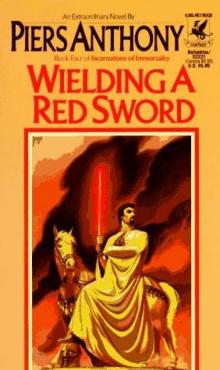 Wielding a Red Sword
Wielding a Red Sword Key to Chroma
Key to Chroma WereWoman
WereWoman Isis Orb
Isis Orb Hair Peace
Hair Peace Two to the Fifth
Two to the Fifth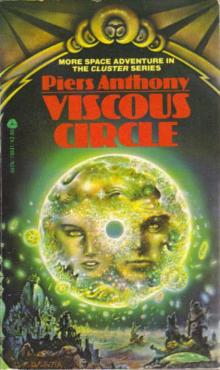 Viscous Circle
Viscous Circle Skeleton Key
Skeleton Key Cautionary Tales
Cautionary Tales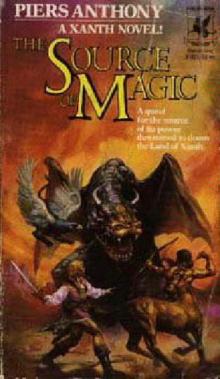 The Source of Magic
The Source of Magic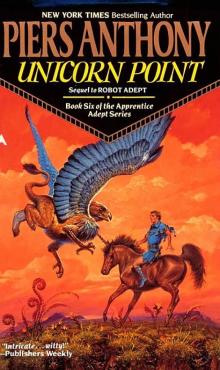 Unicorn Point
Unicorn Point Writer's Retweet
Writer's Retweet Demons Don't Dream
Demons Don't Dream Ogre, Ogre
Ogre, Ogre The Iron Maiden
The Iron Maiden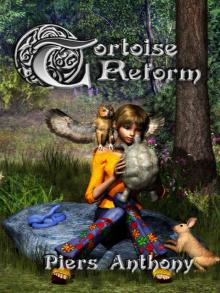 Tortoise Reform
Tortoise Reform Luck of the Draw
Luck of the Draw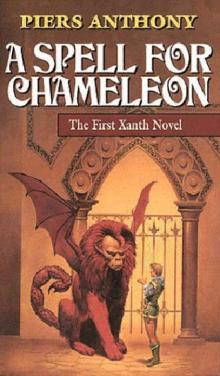 A Spell for Chameleon
A Spell for Chameleon Yon Ill Wind
Yon Ill Wind Currant Events
Currant Events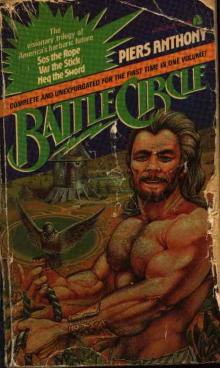 Var the Stick
Var the Stick And Eternity
And Eternity Kiai! & Mistress of Death
Kiai! & Mistress of Death Chimaera's Copper
Chimaera's Copper Refugee
Refugee Isle of View
Isle of View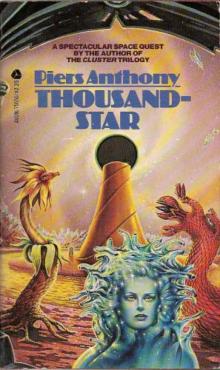 Thousandstar
Thousandstar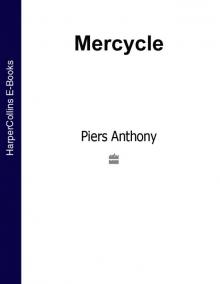 Mer-Cycle
Mer-Cycle Service Goat
Service Goat Five Portraits
Five Portraits Night Mare
Night Mare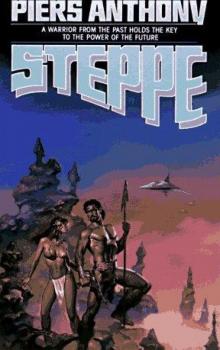 Steppe
Steppe Lavabull
Lavabull Well-Tempered Clavicle
Well-Tempered Clavicle Aladdin Relighted
Aladdin Relighted Aladdin and the Flying Dutchman
Aladdin and the Flying Dutchman Knot Gneiss
Knot Gneiss Roc and a Hard Place
Roc and a Hard Place Aladdin Sins Bad
Aladdin Sins Bad Flytrap
Flytrap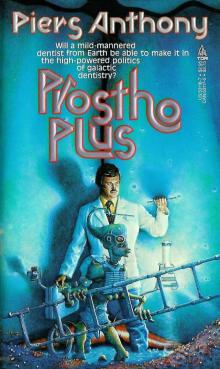 Prostho Plus
Prostho Plus Esrever Doom
Esrever Doom Hair Power
Hair Power The Journey
The Journey Virtue Inverted
Virtue Inverted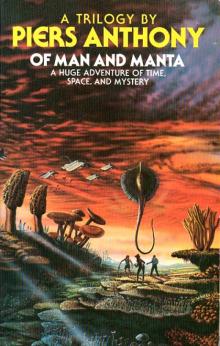 Of Man and Manta Omnibus
Of Man and Manta Omnibus Trail Mix: Amoeba
Trail Mix: Amoeba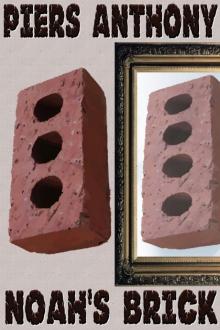 Noah's Brick
Noah's Brick Odd Exam
Odd Exam Magenta Salvation
Magenta Salvation Jest Right
Jest Right Fire Sail
Fire Sail Chthon a-1
Chthon a-1 Amoeba
Amoeba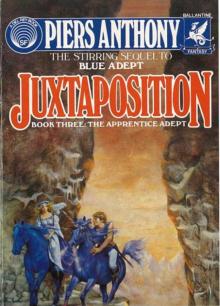 Juxtaposition aa-3
Juxtaposition aa-3 Pira
Pira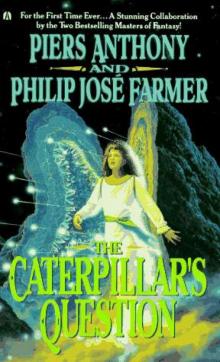 THE CATERPILLARS QUESTION
THE CATERPILLARS QUESTION What Fears Become: An Anthology from The Horror Zine
What Fears Become: An Anthology from The Horror Zine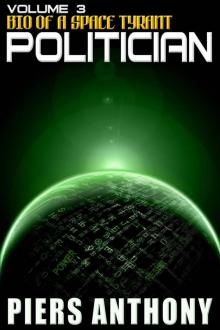 Bio of a Space Tyrant Vol. 3. Politician
Bio of a Space Tyrant Vol. 3. Politician Ogre Ogre x-5
Ogre Ogre x-5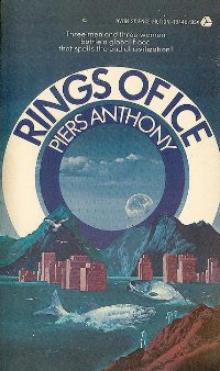 Rings of Ice
Rings of Ice On a Pale Horse ioi-1
On a Pale Horse ioi-1 Luck of the Draw (Xanth)
Luck of the Draw (Xanth)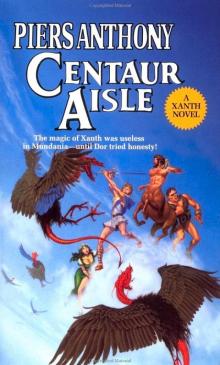 Centaur Aisle x-4
Centaur Aisle x-4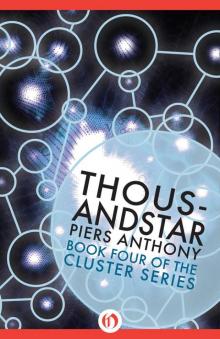 Thousandstar (#4 of the Cluster series)
Thousandstar (#4 of the Cluster series) Gutbucket Quest
Gutbucket Quest Isle of Woman (Geodyssey)
Isle of Woman (Geodyssey)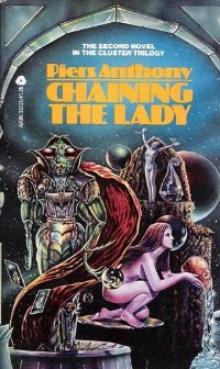 Chaining the Lady c-2
Chaining the Lady c-2 To Be a Woman
To Be a Woman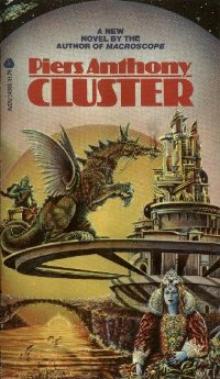 Cluster c-1
Cluster c-1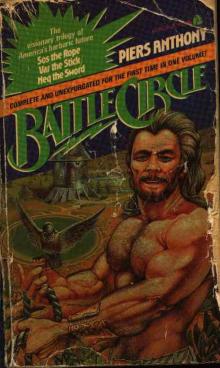 Battle Circle 2 - Var the Stick
Battle Circle 2 - Var the Stick Mercenary (Bio of a Space Tyrant Book 2)
Mercenary (Bio of a Space Tyrant Book 2)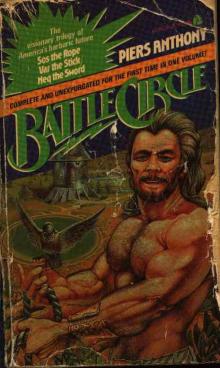 Battle Circle 1 - Sos the Rope
Battle Circle 1 - Sos the Rope Xanth 30 - Stork Naked
Xanth 30 - Stork Naked Secret of Spring
Secret of Spring Xanth 29 - Pet Peeve
Xanth 29 - Pet Peeve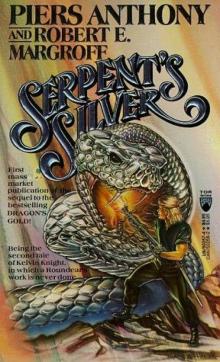 Serpents's Silver
Serpents's Silver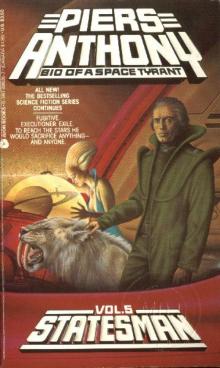 Statesman by Piers Anthony
Statesman by Piers Anthony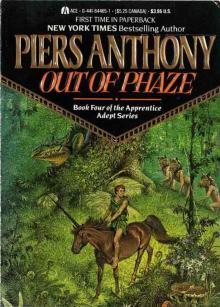 Out of Phaze aa-4
Out of Phaze aa-4 Amazon Slaughter & Curse of the Ninja
Amazon Slaughter & Curse of the Ninja